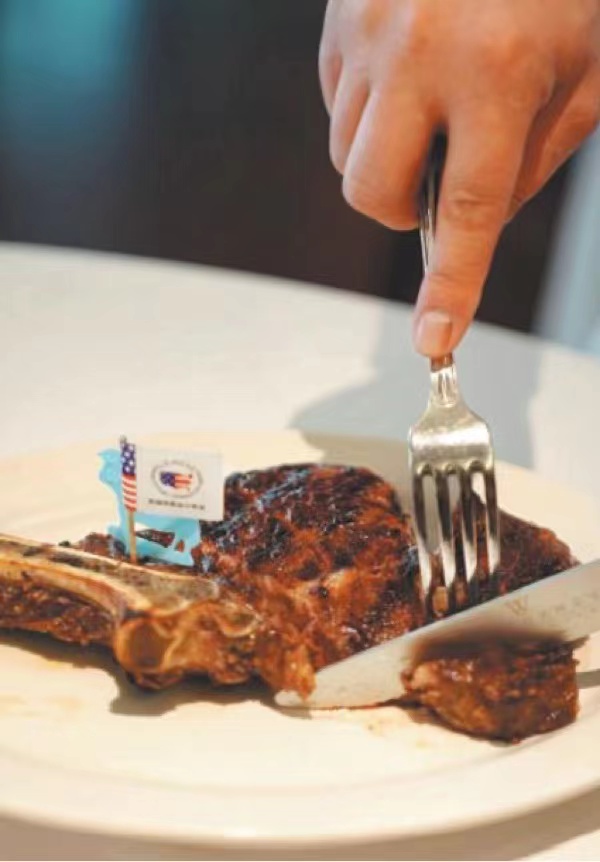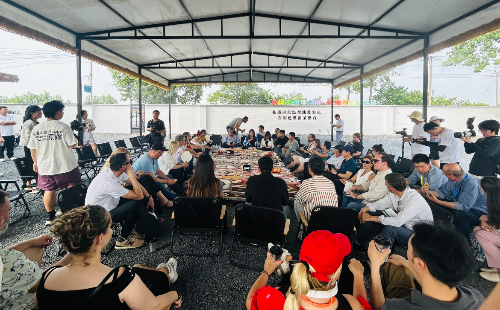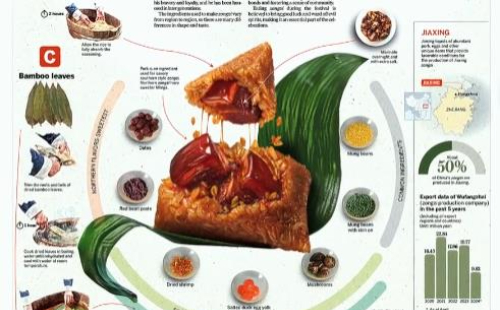Foreign caterers eager to invest in nation
Supporting role

Wolfgang's Steakhouse provides Chinese diners with top-quality steak from the United States. [Photo provided to China Daily]
In July, construction started in Jiading district, Shanghai, on Yum China's supply chain management center, the company's largest greenfield supply chain center project to date. The 61,000-square-meter facility — scheduled for completion in 2024 — will serve as the headquarters for supply chain operations.
Wat said: "Our world-class supply chain is one of our key business enablers, and has helped us mitigate the disruption brought by COVID-19. As our supply chain capabilities go from strength to strength, we believe the center will better support more stores, sales channels and products, while helping drive long-term growth."
As of the end of March, Yum China had 32 logistics centers. It plans to expand its logistics network to 45 to 50 centers over the next five years.
As part of its goal to achieve net-zero value chain greenhouse gas emissions by 2050, Yum China launched KFC's first green pioneer stores in Beijing and Hangzhou, capital of Zhejiang province, in April.
Wat said: "We are committed to driving meaningful change and steering the restaurant industry toward net-zero emissions. We will continue to explore the use of innovative technologies in restaurant construction and operations to promote sustainable development and contribute to the low-carbon economy."
In addition to fast-food chains, high-end restaurants are setting foot in China to meet local customers' rising demands for fine dining and service.
This month, luxury brand Louis Vuitton opened The Hall restaurant in Chengdu, the Sichuan provincial capital — its third restaurant globally. The others are in Paris and Tokyo.
Meanwhile, Wolfgang's Steakhouse from New York is opening a branch in Shanghai, its sixth on the Chinese mainland.
Peter Zwiener, who owns Wolfgang's Steakhouse, has flown to China several times in the past three years to check on his stores as business expands. He inspects each of his 35 outlets worldwide to ensure that they operate on the same level.
"China is growing rapidly. We opened in Shanghai, then Beijing, Shenzhen and Hangzhou. We want to be in all the nation's major cities," he said.
Zwiener said the pandemic has changed the entire catering industry, and in addition to food being served in the restaurant, he has to consider how to bring food to customers at home. One of his solutions is the takeout market.
"It's harder for high-end restaurants to do deliveries. You must make sure the packaging is correct, and you have to rely on the riders to deliver the food quickly and to avoid it being shaken too much during transit," he said.
Besides launching deliveries, the business uses a trailer in Beijing as a portable kitchen to cook its steaks.
"We're collaborating extensively with other partners such as high-end hotels, where we can perhaps open a pop-up on weekends, or we could maybe take over part of their kitchen," Zweiner said, adding that the portable kitchen will enable the business to join many outdoor events.
He also plans to take the portable kitchen to a city where the business doesn't yet have a restaurant.
Zweiner said more Chinese customers are enjoying top-quality steak, and Wolfgang Steakhouse's best-selling steak worldwide is the porterhouse, which is also a popular choice in China.
"A porterhouse is too big for one person, so we slice it so that more diners can share it. Such sharing is really suitable for Chinese customers," he said.
The business also has a wide range of wine and whiskey to pair with steaks, and Zwiener said Chinese customers are highly knowledgeable about wine and have sophisticated tastes.
The company's new branch in Shanghai is set to open in April, and Zwiener is already looking to expand in Chengdu, Suzhou and Nanjing, capital of Jiangsu.
He doesn't think that the pandemic will change his plans in China. "People have to eat, and eventually this coronavirus will go away one day," he said.





 play
play